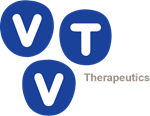Shareholder Tools
Press Release
View printer-friendly version << Back
vTv Therapeutics Presents Baseline Characteristics of the Enrolled Subjects in the Elevage Study Suggesting Comparability to the Post-Hoc Diabetes Subgroup of the Phase 3 STEADFAST Study
The Elevage data are being presented today at the 13th Clinical Trials on Alzheimer’s
“We have completed enrollment in Part 1 of Elevage and are pleased that the baseline characteristics are consistent with those of the STEADFAST T2D subgroup in which we saw benefit for azeliragon compared with placebo,” said
Baseline characteristic data presented today demonstrate that the Elevage patient population is similar to that of the STEADFAST T2D subgroup with respect to age, height, weight, body-mass index, ApoE status, background AD medication, HbA1c, and scores on multiple cognitive assessments including Mini-Mental State Exam (MMSE), ADAS-cog11, CDR Global, and CDR Sum of Boxes. The company expects to report topline safety and efficacy data from Part 1 of the Elevage study in
Details of the CTAD digital presentation are:
Oral Presentation Title: “The Azeliragon Elevage Study: Study Update and Preliminary Data on Baseline Characteristics of Participants with Mild Alzheimer’s Disease and Type 2 Diabetes Randomized in Part 1”
Presentation Number: LB5
Category: On Demand,
Date and Time: Wednesday, November 4, 2020, Available from
About the Elevage Study
The Elevage Study is a randomized, double-blind, placebo-controlled clinical trial evaluating azeliragon in individuals ages 50 – 85 with probable mild-Alzheimer’s disease and type 2 diabetes. The objective of the Elevage Study is to replicate in a randomized double-blind, placebo controlled study the results observed in a post hoc analysis of the phase 3 STEADFAST trial A-Study in which a subgroup of forty-seven (47) patients with mild Alzheimer’s disease and type 2 diabetes treated with azeliragon demonstrated nominally statistically significant improvements in cognition on the ADAS-cog11 scale of 5.5 points (p=0.006) at month 18 compared to the same subgroup of patients treated with placebo. Azeliragon associated improvement was nominally significant as early as month 6 on the ADAS-cog11 scale (4.9 points, p<0.001).
About
Forward-Looking Statements
This release contains forward-looking statements, which involve risks and uncertainties. These forward-looking statements can be identified by the use of forward-looking terminology, including the terms “anticipate,” “believe,” “could,” “estimate,” “expect,” “intend,” “may,” “plan,” “potential,” “predict,” “project,” “should,” “target,” “will,” “would” and, in each case, their negative or other various or comparable terminology. All statements other than statements of historical facts contained in this release, including statements regarding the timing of our clinical trials, our strategy, future operations, future financial position, future revenue, projected costs, prospects, plans, objectives of management and expected market growth are forward-looking statements. These statements involve known and unknown risks, uncertainties and other important factors that may cause our actual results, performance or achievements to be materially different from any future results, performance or achievements expressed or implied by the forward-looking statements. Important factors that could cause our results to vary from expectations include those described under the heading “Risk Factors” in our Annual Report on Form 10-K and our other filings with the
Contacts
Investors:
CDavis@LifeSciAdvisors.com
or
Media:
646-871-8485
gsilver@lazarpartners.com
Source: vTv Therapeutics Inc.
Investor Overview
- Investor Overview
- Stock Information
- Financial Information
- News & Events
- Corporate Governance
- Shareholder Services
